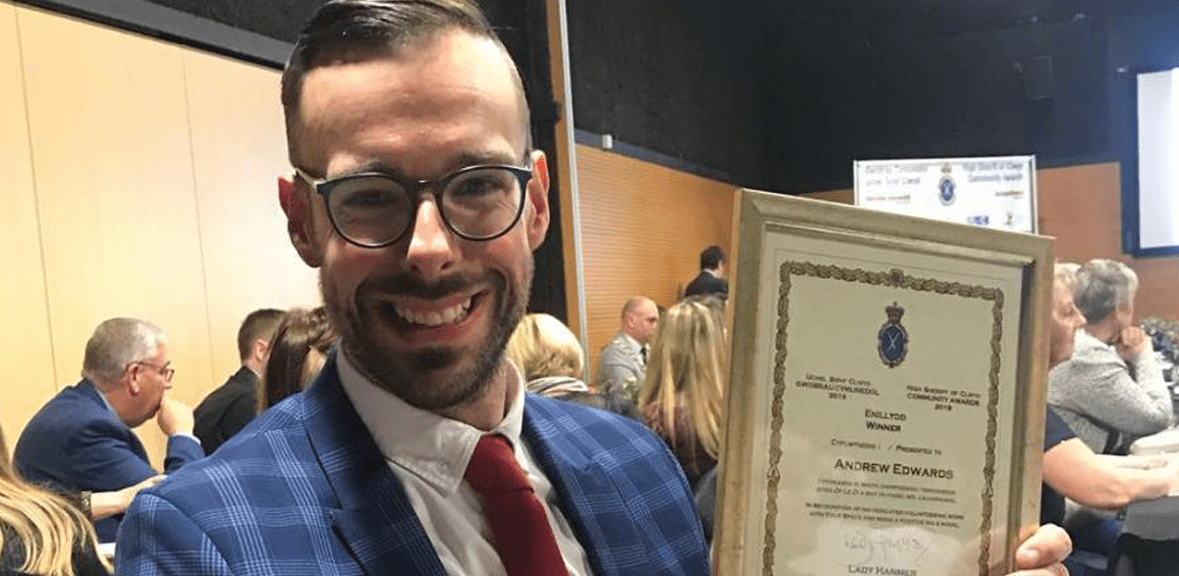
As part of our Autism Together Awareness Month, author, speaker and autism champion, Andrew Edwards (pictured), discusses the importance of autism awareness and acceptance…
Autism Awareness
By Andrew Edwards
April is Autism Awareness Month. As some readers may know, I was diagnosed with autism aged four in April 1989.
Upon diagnosing me, the specialist rather heartlessly advised my (now recently departed) mother Hazel Davies (then Edwards) “To go home and watch “Rain Man”. It is likely your son will be institutionalised.” I think that we proved him wrong didn’t we, Ma?
I would like to naively think that whenever someone you love is diagnosed with autism, when you are told by the health professional it will be a rather less heartless prognosis.
Over time in my 36 years, I have seen awareness of autism from the general public increase markedly. Even going back to my early teenage years, many people would seemingly react blankly when informed that I was autistic. Nowadays, the vast majority of the general population are aware of autism but, with the condition being such a broad spectrum, understanding it is far from easy. This is even so for close family members with years of experience and, even myself.
There are now services from the third sector and in society that my beloved Ma could only have dreamed of having for her autistic son when I was a child. This is even the case with many organisations, venues and sports clubs now offering ‘Autism Friendly Sessions’.
However, in my opinion, there is a vast black hole for those on the spectrum, such as myself, when we reach adulthood. This is especially the case if the person with autism, such as myself, who may require help in the home that they own, would like to go on dates to find the correct romantic partner. They might also like to learn to drive. Whilst seemingly having the ability to emotionally express themselves in a very articulate and eloquent manner along with an outgoing personality, nonetheless, they may require a little assistance to achieve or acquire these goals and skills.
Due to this, I feel that I don’t particularly fit many preconceptions regarding autism. There must be more out there like me in this respect that don’t ostensibly fit the traditional perceptions of autism.
As we see more people, especially girls, being diagnosed with autism in early adulthood when hitherto they may have slipped through the proverbial net, I now know there are more people like me with autism. The difficult part is I just need to find ones my own age bracket for online dating, which isn’t easy.
I also think that autism is totally under diagnosed. Although there are an estimated 700,000 people diagnosed with autism I am of the firm belief that there are far more people remaining undiagnosed in the United Kingdom. Due to long waiting lists, going through life undetected or lack of money, many may never be diagnosed.
Personally, in recent years, I have become more aware of a lot more of the vagaries regarding my condition. Of course, with the wonderful, open and honest upbringing I had from my beloved mother, autism was never a taboo subject and I was aware that I had the condition from as long as I can remember. I was always cognisant and able to clearly describe many traits of the condition from a very young age.
However, I have learned even more about myself and my autism since starting the process of writing my memoir “I’ve Got a Stat for You – My Life with Autism” following redundancy from my job with Manchester United TV seven years ago.
Since then, certain behaviours that I displayed hitherto that I didn’t know were traits of autism – due to me spending most of my time with people without the condition – I have subsequently found to be more related to autism. These could be as innocuous as not remembering short term information. In comparison, my long term memory, which has pretty much got me everywhere in life, has always been exceedingly good.
But then, everyday is a “school day” – especially as autism is lifelong. I will always learn about the practicalities of what works for me. I will never fully understand my condition, or anything else for that matter, as having total knowledge of a subject is exceedingly unlikely.
My life, and life generally, will always be evolving.
Find out more about Andrew and read more of his writing by visiting his website:
www.andrewedwardsautism.co.uk
